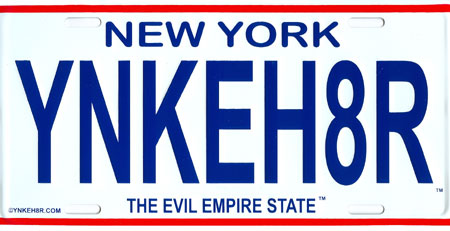Ever heard of Sam Rice?
Rice played for the Washington Senators from 1915 to 1933, and in that time amassed 2,987 hits. He hit .322, stole 352 bases, and must have had a great arm: only 4 right fielders in history have thrown more guys out.
But those 2,987 hits... Old Sam just missed 3,000, and the baseball world has entirely forgotten him. Didn't even make the Hall of Fame till the Veterans Committee voted him in thirty years after he retired.
13 hits. One more hit a year. In Crash Davis' words, "just one extra flare...just one - a gorp... you get a groundball, you get a groundball with eyes... you get a dying quail, just one more dying quail...", and Sam Rice would have 3,000 hits.
And you'd have heard of him. Because in baseball, we care about milestones. We care about them a lot.
I bring this up because our old friend Derek Jeter announced his retirement this Spring. He has one more season to brush up the back of his baseball card, to submit his final report card to Baseball Posterity.
He's in no danger of being forgotten like poor old Sam. He's got his 3,000 hits. Plus 5 World Series rings, 13 All-Star games, $250 million in career earnings, and 5 dubiously earned Gold Glove awards. He's a lock for the Hall of Fame.
But is he, as ESPN (and many others have) asked, an All-Time Great?*
* If you're one of those people who believe this sort of argument/debate is pointless, well, you're wrong. Every sports argument, every sports conversation ever had, is ultimately about one thing: How good is X? How good is that player, play, team, game, season, coach, GM, sport, rule, manager, call, skill, prospect, announcer, camera angle? And the best sports conversations, the most enduring ones, are the All-Time Great discussions. Jeter, because of his vast legions of worshipers and critics, is, along with Brady vs. Manning, the best sports debate of our time.
In 2009, I argued that he'd need to get 3,516 hits to claim that status. Jeter critics have long argued that Jeter has too few individual accomplishments to rank among the best of the best. No MVPs, no batting titles, no home run titles. And for most of his career, he wasn't even the best shortstop in the league, as guys like A-Rod, Nomar, Tejada, Tulowitzki, Hanley Ramirez - heck, even guys like Rafael Furcal and Erick Aybar - had better seasons.
Derek Jeter does have one all-time great skill though: getting hits. Yes, he's had a TON of plate appearances*, but he hit for a very good average his whole career, and all those dying quails add up. (And man, even his biggest fans would acknowledge, he was the King of the Dying Quail.)
* he led the league 5 times in plate appearances, and had over 700 ten times! If you want to be an all-time hit leader, I strongly encourage you to stay healthy, and hit at the top of an order that scores 900 runs a year.
I argued that if Jeter reached 3,516 hits he'd pass Tris Speaker, and crack the Top 5 all-time, earning him All Time Great status. In fact, the math showed that if, like Pete Rose, he stayed healthy and played into his 40's, he had an outside shot at 4,000 hits.
The next two years he got 341 hits, including his 3000th. And he had a fantastic 2012 campaign, leading the league with 216 hits. But 2013 was lost to injury and he announced his retirement for the end of the 2014 season.
 Tris Speaker is 198 hits away. It's possible, given his 216 hits only 2 years ago, but he turns 40 in June and is coming off major injury.
Tris Speaker is 198 hits away. It's possible, given his 216 hits only 2 years ago, but he turns 40 in June and is coming off major injury. But there's another interesting target in reach: Honus Wagner. The Flying Dutchman had 3,420 hits, and moderately healthy season from Jeter will give him the 104 hits he needs to catch him, making him the shortstop with the most hits all time.
You still couldn't put his accomplishments quite up there with Wagner. Like other members of the GOAT Club (Greatest of All Time), old Honus' trophy cabinet is overflowing with individual titles. He won 8 batting titles, had enough pop to lead the league in slugging 5 times (no homers but truckloads of doubles and triples), and took the stolen base crown 5 times.
But if Mr. November picks up his 3,421st hit sometime this summer, he can show up at the GOAT Club meeting, turn to all his critics and say....well, something bland and boring, because that's what he always says.
But he will belong.


